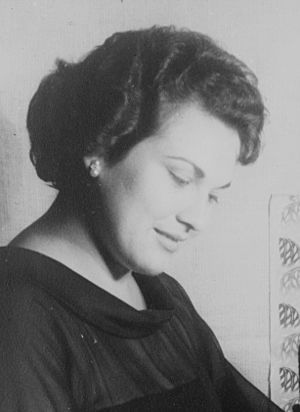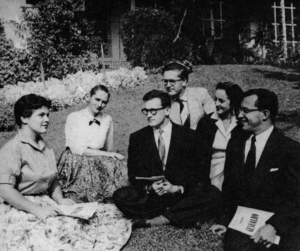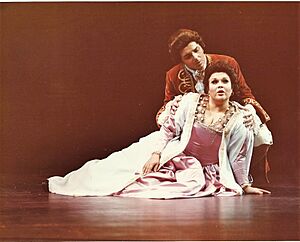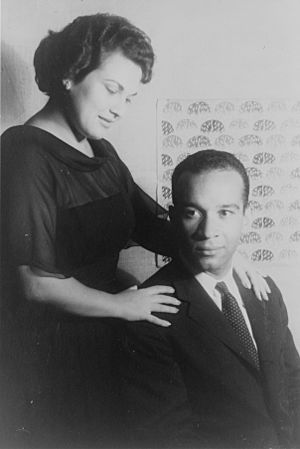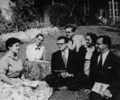Marilyn Horne facts for kids
Marilyn Berneice Horne (born January 16, 1934) is a famous American opera singer. She is known for her powerful voice, especially in roles that needed beautiful singing and strong breath control. Marilyn Horne could also perform very difficult musical parts called coloratura. She has received many awards, including the National Medal of Arts and the Kennedy Center Honors. She has also won four Grammy Awards for her amazing music.
Contents
Early Life and Family
Marilyn Berneice Horne was born in Bradford, Pennsylvania. She was one of four children. Her parents, Bentz and Berneice Horne, were involved in local politics. Her mother was a city assessor, and her father was a county assessor.
Marilyn's father was also a singer. He noticed Marilyn's singing talent early on. To help her get the best training, her family moved to Long Beach, California, when she was 11 years old.
When Marilyn was 13, she joined a new singing group called the Roger Wagner Chorale. She went to Long Beach Polytechnic High School. While in high school, she sang in the St. Luke's Episcopal Church Choir. This choir often worked for movie studios and recorded music.
Education and Training
Marilyn Horne earned a scholarship to the University of Southern California. There, she studied singing with William Vennard and Gwendolyn Koldofsky. She also took special master classes with the famous singer Lotte Lehmann.
A Star's Journey
Marilyn Horne's first big professional job was in 1954. She sang the voice for Dorothy Dandridge in the movie Carmen Jones. Before this, she sang background vocals for TV shows and recorded popular songs. She even appeared on TV shows like The Odd Couple and The Carol Burnett Show.
Her opera career truly began when the famous composer Igor Stravinsky noticed her. He invited her to perform at a festival in Venice in 1956. She then stayed in Europe for three years, singing for the Gelsenkirchen Opera. She was highly praised for her role as Marie in Alban Berg's opera Wozzeck.
In 1960, she returned to the United States. She performed in Wozzeck at the San Francisco Opera. In 1961, she made her debut at the Lyric Opera of Chicago.
Singing with Joan Sutherland
For many years, Marilyn Horne often performed with the Australian singer Dame Joan Sutherland. They were known for singing bel canto music together. Their first performance was in New York City in 1961. It was so successful that they repeated it several times. They also sang together in the opera Semiramide in 1965.
Horne made her debut at the Royal Opera House in London in 1964. Her first performance at La Scala in Italy was in 1969. That same year, she received a seven-minute standing ovation during a performance of Rossini's Le siège de Corinthe. This was a huge moment in her career.
In 1970, Marilyn Horne made her debut at the Metropolitan Opera in New York City. She sang regularly there, even opening the 1972-1973 season as Carmen. In 1984, she sang the main role in Handel's opera Rinaldo. This was the first time a Handel opera was performed at the Met.
Beyond Opera
While famous for opera, Marilyn Horne also sang American music. She performed songs by modern composers and traditional popular tunes. You can hear her singing "Love, Look Away" in the 1961 film Flower Drum Song. She also sang in the recording of The King and I with Julie Andrews.
In 1983, she wrote a book about her life called My Life. A second book, Marilyn Horne: The Song Continues, came out in 2004.
On July 5, 1986, she performed with the New York Philharmonic orchestra in Central Park. This concert celebrated the 100th anniversary of the Statue of Liberty. She sang a famous song from the opera Carmen. In January 1993, she sang at the inauguration of President Bill Clinton.
Retirement and Teaching
Marilyn Horne retired from performing concerts in 1999. However, she still sometimes sings at pop concerts. She also created the Marilyn Horne Foundation. This foundation helps keep the art of vocal recitals alive. She teaches singing classes at several universities, including the Oberlin Conservatory of Music and the Manhattan School of Music.
From 1997 to 2018, Horne led the Voice Program at the Music Academy of the West. She is now the Honorary Voice Program Director there.
Marilyn Horne Museum
In 2013, Marilyn Horne gave her personal collection of items to the University of Pittsburgh. This led to the creation of the Marilyn Horne Museum and Exhibit Center. It opened on May 6, 2017, at the Pitt Bradford campus. The museum displays parts of her collection, and admission is free.
Personal Life
Marilyn Horne was married to the conductor Henry Lewis from 1960 to 1979. They met in college. In 1965, they had a daughter named Angela. After their marriage ended, she had a long relationship with the Greek singer Nicola Zaccaria.
In December 2005, Marilyn Horne was diagnosed with pancreatic cancer. She has since recovered and continues to be active. In 2010, she happily said, "I'm still here!"
Awards and Recognition
Marilyn Horne has received many awards throughout her career. In 1983, a New York Times article listed her as one of the greatest singers to ever perform at the Metropolitan Opera. She was the only one still actively singing at that time.
Some of her awards include:
- Most Promising New Classical Recording Artist, 1964
- Handel Medallion, 1980
- Best Classical Vocal Soloist Performance, 1981 and 1983
- Gold Medal of Merit from the National Society of Arts and Letters, 1987
- Best Opera Recording, 1993
- National Medal of Arts, 1992
- Commandeur de l'ordre des Arts et des Lettres, 1995
- Kennedy Center Honors, 1995
- Lifetime Achievement Grammy Award, 2021
Images for kids
See also
 In Spanish: Marilyn Horne para niños
In Spanish: Marilyn Horne para niños
- The Rossini Bicentennial Birthday Gala
- Thomas: Mignon (Antonio de Almeida recording)
- Marilyn Horne & Frederica von Stade: Lieder & Duets
- A Salute to American Music (Richard Tucker Music Foundation Gala XVI, 1991)
- The Metropolitan Opera Centennial Gala
Works
 | Madam C. J. Walker |
 | Janet Emerson Bashen |
 | Annie Turnbo Malone |
 | Maggie L. Walker |


